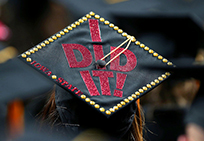Pausing for pizza
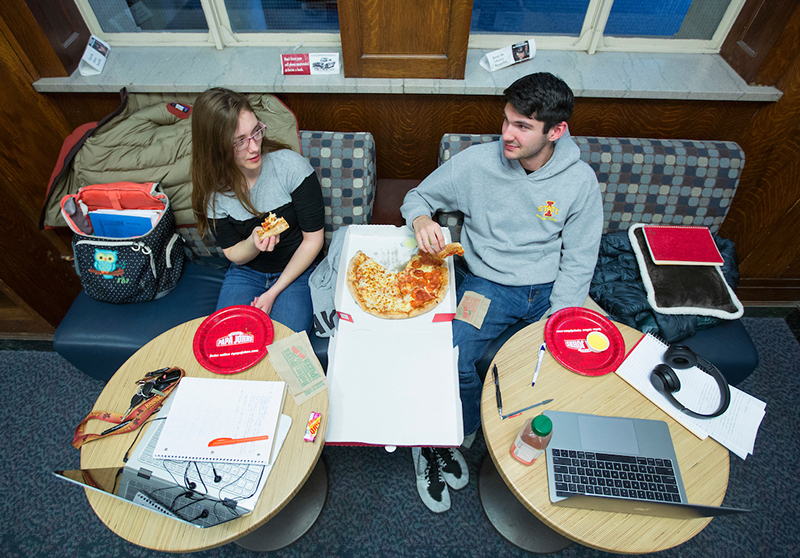
Photo by Christopher Gannon.
Animal science junior Nicole Johnson (left), and biology senior Ryan Walker share a quiet corner and a pizza while prepping for final exams Monday in Parks Library's fireplace reading room. An estimated 2,449 students are completing their Iowa State degrees this month.
Zipcar is the new car-sharing provider on campus

Zipcar vehicles will arrive on campus in January.
Zipcar is the new provider for Iowa State's car-sharing program, with vehicles scheduled to arrive on campus the first week of January. The contract runs through June 2021, with an annual renewal option thereafter. Enterprise's CarShare program had been on campus since fall 2011.
While the program's target audience is students, employees are welcome to enroll as well.
Car sharing's popularity is based on economy and sustainability. Drivers reserve vehicles by the hour or day for personal use -- shopping, dining out, visiting friends -- to avoid the expense of purchasing and maintaining their own set of wheels. Car sharing can be a factor in reducing the number of student vehicles on campus.
Transportation services remains the vehicle provider for university-sponsored travel.
Learn more
The world's largest car-sharing network, Zipcar also services the most college campuses -- more than 600 across North America. Zipcar pricing includes gas, insurance, maintenance, 24-hour roadside assistance and 180 miles of driving (per 24 hours). Members must be at least 18 years old and have a valid driver's license.
The Cyclone fleet
Initially, the Zipcar fleet at Iowa State will feature three vehicles, two of which will be Ford Focuses (the third is to be determined). Demand for the program could increase this number over time. Two vehicles will be parked in the Stange Road lot just north of the railroad tracks (Lot 119) and one will be parked west of Martin residence hall (Lot 59A). The Zipcar reserved stalls are identified with signs.
"Offering this 24-hour, on-campus service provides our community members with access to cars when they need them," said director of sustainability Merry Rankin. "It also eliminates the hassle and challenge of maintaining and parking a personal car."
How to join
The Zipcar annual membership fee is $25, but Ford, which is a Zipcar partner, subsidizes the first year, reducing the cost to $15 for students, faculty and staff. Current Enterprise CarShare members may join Zipcar for free through Zipcar's Iowa State website.
Ford also subsidizes the hourly rate for its vehicles on university campuses. As a result, the hourly rate starts at $7.50 and the daily rate at $69.
Members can apply online. Membership cards, which provide access to the Zipcar vehicles, are sent within a week via U.S. mail. Zipcar reservations -- from one hour to seven days -- are made online or via a mobile app. Members hold their card over a card reader on the windshield to unlock and lock a Zipcar. Keys and a gas card are kept in each vehicle.
New provider
Zipcar is a subsidiary of Avis Budget Group. Procurement services rebid the service this summer and director Cory Harms said Zipcar employees have shown a willingness and capacity to promote and expand car sharing at Iowa State. Under the previous contract, three assigned vehicles had shrunk to two.
"We're confident this is a better program and will get utilization up," Harms said, noting that car-sharing programs at universities the size of Iowa State typically have 10 to 15 vehicles.
Driver rules
Zipcar requests these six courtesies from its members:
- Report damage to the toll-free Zipcar number (and inspect the car before driving)
- Clean out trash and personal items when you return a vehicle
- Don't smoke in the car
- Fill the gas tank if it's down to a quarter tank or less (use the fuel card inside the car)
- Return the vehicle on time (avoid a late fee)
- Keep pets in travel carriers
Enrollment, affordability lead to rise in NTE instruction
Meeting coverage
- Inside Iowa State summaries
- Twitter (@InsideIowaState)
Senior vice president and provost Jonathan Wickert presented his annual update on instruction done by non-tenure-eligible (NTE) faculty at the Dec. 12 Faculty Senate meeting.
The Faculty Handbook, following teaching percentage thresholds recommended by the American Association of University Professors, limits NTE instruction to 15 percent university-wide and 25 percent within departments.
"The level of instruction done by non-tenture-eligible faculty is really vital to the university for executing our mission in an era of growing and large enrollment and pretty tight resources," Wickert said.
Using data from last year's AAUP (American Association of University Professors) annual compensation study, Wickert showed that NTE faculty appointments make up 17.4 percent of Iowa State's total faculty, near the average (19.5 percent) and median (15 percent) among 10 peer institutions. Penn State and Ohio State universities had the highest (35) and lowest (9.7) percentages in that group, respectively.
"We're not remarkably out of whack relative to our peer group, in terms of the number of NTE faculty appointments that we have institution-wide," Wickert said.
Wickert also shared instructional FTEs (full-time equivalents) to illustrate the distribution of full- and part-time teaching responsibilities among faculty (tenured, tenure-eligible and NTE), staff and graduate students. Non-teaching faculty, such as clinicians or full-time extension appointments, are not calculated in the instructional FTEs.
|
Instructional FTEs |
Fall 2017 |
Fall 2016 |
Fall 2015 |
|
Tenured, tenure-eligible |
1,116.2 |
1,118.0 |
1,128.7 |
|
Non-tenure-eligible |
425.1 |
406.7 |
379.7 |
|
Graduate assistants |
526.4 |
531.4 |
496.0 |
|
Total FTEs |
2,067.7 |
2,056.1 |
2,004.4 |
The percentage of instruction done by NTE faculty and staff and was measured three ways:
- Section credits, 34.8 percent
- Student credit hours, 41 percent
- Course sections, 33.6 percent
"Those numbers vary, depending on how you count, but the overall picture is very consistent across those three measures," Wickert said.
Based on section credits, 35 of 56 departments exceed the Faculty Handbook's 25 percent threshold. That number rises to 36 when using student credit hours and course section calculations. Five departments exceed 50 percent NTE instruction (section credits) -- Greenlee School of Journalism and Mass Communication (63.2 percent), world languages and cultures (55.4), English (54), accounting (53.7) and natural resource ecology and management (52.1).
Wickert pointed to several factors contributing to more NTE instruction:
- Enrollment growth
- Affordability
- Teaching and research balance for tenure/tenure-track faculty
- Partner accommodations and dual career hires
- Practitioner experience for capstone and case-based learning
"The institutional numbers are the super-position of many, many decisions that are made in each academic department -- based on teaching needs, faculty activities, research activity and the budgetary environment," Wickert said.
Mark Westgate, a professor in agronomy, asked Wickert about the relevance of the 25 percent threshold.
"I think it should be a conversation," Wickert said. "A lot has changed in the past 15 years, here and nationally in higher education. I think it will continue to be a very important conversation point and important accountability for me and the deans to report to the senate about the composition of the faculty."
New degrees
Senators unanimously approved three academic programs, including:
- A minor in textile design, offered by the art and visual culture, and apparel, events and hospitality management departments
- A Bachelor of Science in actuarial science, offered by the College of Business and the math and statistics departments in the College of Liberal Arts and Sciences
- A Bachelor of Science in data science, offered by the College of Liberal Arts and Sciences
Language changes in the Faculty Handbook's policy on unacceptable performance of duty also was approved. The update more clearly defines the policy to include tenure-eligible and NTE faculty, not just tenured faculty.
January votes
Five business items were introduced for consideration and a vote at the January senate meeting. Updated language for the course catalog would add an option for instructors and departments to use administrative drops when students don't meet the course prerequisites.
"This has been a real challenge, in terms of students taking courses they aren't prepared for," said Tim Bigelow, chair of the senate's academic affairs council.
Bigelow's committee also proposed updated eligibility requirements for students returning after a minimum five-year absence (academic renewal). The change would require students to be in good academic standing -- a minimum 2.0 grade point average -- after one semester, rather than the first year.
"It's basically a way for these students to have a fresh start and, ultimately, be successful," Bigelow said.
A recommended change to the major sanction process in the Faculty Handbook (section 7.2.5.3) removes a step referring to a review by an administrative law judge through the state's Administrative Procedure Act. It would not eliminate the option, but would remove the state-level review from procedures outlining ISU's internal and peer-reviewed processes.
Finally, two degree programs also were proposed:
- A master's degree in real estate development, an interdisciplinary degree involving five departments -- architecture; civil, construction and environmental engineering; community and regional planning; finance; and management
- A doctorate in population sciences in animal health, administered by the veterinary diagnostic and production animal medicine department. The program is intended to prepare graduates to "respond to health and welfare issues in animal populations through research, education, clinical medicine, extension and outreach."
What you need to know about winter break
Winter break is coming, which means many Iowa State employees will take an extended stretch of time off. Go ahead, if possible -- university leaders encourage it.
As they have every year since 2009, Iowa State administrators this fall approved a partial closure between the Christmas and New Year's Day holidays. The optional shutdown saves on energy costs while most students are away from campus and promotes a healthy work-life balance for employees.
This year, the shutdown period includes 10 days, Dec. 23-Jan.1. That includes three university holidays (Dec. 25, Dec. 26 and Jan. 1), two weekends (Dec. 23-24 and Dec. 30-31) and three regular workdays (Dec. 27-29).
For more info, check out:
Policy documents
- Staffing guidance for university breaks
- FAQ about university breaks
- Vacation leave policy
- Office hours policy
- Holidays policy
- Flex time policy
- Leave of absence without pay policy
Related coverage
How it works
Offices aren't required to close, and employees aren't required to take time off. Workers who choose not to work during the shutdown period can use vacation time or take unpaid leave. Employees who take unpaid leave will be paid for university holidays.
Many university facilities will be closed and locked during break, as they are on holidays. Building supervisors should have received an email from facilities planning and management (FPM) with a survey seeking information about closure plans. Responses were due Dec. 13. Last year, 46 campus buildings closed during the semester break, said Wendy Kisch, FPM's assistant director of facilities services. Sixteen of those 46 buildings set their temperature back to the minimum 65 degrees while closed, Kisch said.
Top university leaders determine workforce needs in the units they oversee and approve office closures or reductions in operating hours. Units or individual employees responsible for essential or ongoing work may be required to continue regular schedules. Examples of critical functions include public safety, snow removal and utility maintenance, as well as some research and customer-service jobs. In units closed during the break, supervisors may establish alternative work locations or projects for employees who elect to work.
Supervisors in closed units may need to establish how to handle incoming phone and email messages. For instance, messages could be routed to a single email and voicemail account to be checked by a designated employee. Also, consider communicating holiday hours on your department's website and in personal voicemail and email messages.
Employees with questions can contact their departmental human resources liaison or employee/labor relations staff with University Human Resources at hrshelp@iastate.edu or 294-4800.
Tips for buttoning up
During the 2016-17 winter break, reduced activity helped save more than $110,000 on electricity and steam costs, according to Jeff Witt, FPM director of utilities. But those savings depend in part on employees preparing their workplaces to use less power and stay safe. Here's a checklist to review before heading out for the holidays:
- Shut down all computers, printers and other accessories. If possible, plug computers and printers into a power strip and then shut off the power strip.
- Leave your office computer on if you need remote access from home, but turn off the monitor, printer, speakers and any other connected devices. A computer's sleep mode uses less energy than full power, but shutting it off completely protects data. A machine may be left on during break if it's providing access to a critical application.
- Turn off and unplug copiers.
- Shut off and unplug small appliances, such as coffee pots and microwaves.
- Unplug chargers for electronic devices.
- Make sure faucets in restrooms and break rooms are turned off and not dripping. If you notice a dripping faucet, contact the FPM service center at 294-5100.
- If you can manually adjust the thermostat in your office, turn it down to 65 degrees.
- Shut down unnecessary climate-controlled plant growth chambers.
- Close fume hood sashes completely, if possible. Otherwise, open them only minimally.
- Shut down cooling water systems to eliminate potential flooding issues.
- Turn off your office lights and public lighting, such as hallways, restrooms and conference rooms.
- Check windows to make sure they're tightly closed.
No snow surprises
FPM crews will work reduced hours during the partial shutdown. Snow removal will be limited from Dec. 23 through Jan. 1, which means parking lots and secondary buildings may not be plowed by 8 a.m. Staff also will not plow lots or sweep sidewalks for less than 2 inches of snow outside of regular business hours, weekdays from 7 a.m. to 4 p.m.
What's open, what's closed during winter break
Dozens of academic buildings will close down during the winter break, as will many that serve the campus community and the general public. Break hours for some public buildings, offices and services are listed below. The university holidays are Dec. 25-26 and Jan. 1. The spring semester begins Jan. 8.
For more info, check out:
Ames/ISU Ice Arena
Closed Dec. 25
Check online schedule for daily public skating hours
Athletics ticket offices
Closed Dec. 22-27 and Dec. 30-Jan. 1
Open noon-4 p.m. Dec. 28-29
Hilton Coliseum ticket office opens one hour before games
Chemistry Stores
Closed Dec. 22-Jan. 1, except Dec. 27, 9 a.m.-3 p.m.
CyRide
No service Dec. 25 and Jan. 1
Reduced hours Dec. 16-Jan. 7, including no service after 6 p.m. on Dec. 24 and Dec. 31
Iowa State Center ticket office
Closed Dec. 23-Jan. 1
ISU Book Store
Closed Dec. 23-26 and Dec. 30-Jan. 1
Reduced hours Dec. 18-Jan. 4
ISU Dining (dining centers, restaurants, cafés and convenience stores)
Closed Dec. 16-Jan. 1
Locations begin opening Jan. 2. Check online schedule for details.
Memorial Union
The MU will be open throughout the break, as will the parking ramp. However, many establishments and offices will be closed Dec. 18-Jan. 7, including:
- Browsing Library and Chapel
- CyBowl & Billiards
- ISU Lectures Office
- Maintenance Shop
- Multicultural Center
- Post Office
- Student Government
- Student Union Board
- Workspace
Parks Library
Closed Dec. 16-17, Dec. 23-26, Dec. 30-Jan. 1 and Jan. 6-7
Reduced hours during break
Tech lending closed Dec. 27-29
Recreation Services (State Gym, Beyer Hall and Lied Center)
Closed Dec. 24-26 and Jan. 1
Reduced hours Dec. 16-Jan. 6
State Gym pool closed Dec. 16-Jan. 1 for repairs
Reiman Gardens
Closed Dec. 25 and Jan. 1
Transportation Services
Closed Dec. 23-Jan. 1
For vehicle reservations that begin during that time, select a start time for Dec. 22 between 3 and 5 p.m. for early key pickup. Include note in comments section stating when you'll take vehicle from lot. Access to on-site fuel will be open 24/7.
University museums (all locations)
Closed Dec. 18-Jan. 5
Rajala reappointed as Engineering dean
Sarah Rajala, James L. and Katherine S. Melsa Dean of Engineering, has been reappointed for another five-year term. She has served as dean since April 2013.
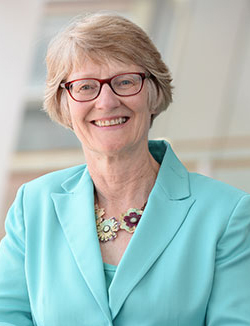
Sarah Rajala
During her initial term, Rajala managed the college through a period of unprecedented enrollment growth, increased recruitment of diverse faculty and students, and enhanced the quality of the college's facilities. She maintained a high level of engagement with alumni, donors, and business and industry leaders and facilitated strong philanthropic support.
"Engineering always has been one of Iowa State's core strengths, as evidenced by its record enrollments, research funding and highly successful alumni," President Wendy Wintersteen said. "I very much appreciate Sarah's leadership, and I know it will continue during her next term as dean."
Senior vice president and provost Jonathan Wickert thanked students, faculty and staff in the college who participated in the review process. He also thanked the college's dean evaluation committee, chaired by professor and chair of agricultural and biosystems engineering Steve Mickelson, for managing the comprehensive review process.
"It is a great privilege to lead the college's 9,600 students and 500 faculty and staff," Rajala said. "I am proud of our work to this point and look forward to even greater accomplishments in the years to come."
Rajala earned her bachelor's degree in electrical engineering from Michigan Technological University, Houghton, and master's and doctoral degrees from Rice University, Houston. Prior to arriving at Iowa State, she served as engineering dean and chair of electrical and computer engineering at Mississippi State University, Starkville, and associate dean for research and graduate programs at North Carolina State University, Raleigh.
Students develop signature ice cream flavor
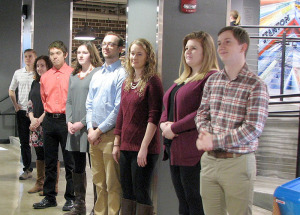
Three student teams wait to learn the winner of the signature ice cream contest. The announcement was made Dec. 8 in the Friley Windows dining center. Submitted photo.
To give students dairy research and development experience, the food science and human nutrition department organized a signature ice cream contest this fall.
The winning concept, "Cyscream," was announced during a Dec. 8 ceremony at Friley Hall's Windows dining center. It was developed by a four-person team of senior food science majors and members of the dairy products evaluation club. Team members said they had about six weeks to develop the concept and submit a proposal.
Cyscream's name and ingredients reflect Iowa State and its traditions, as explained by the team in its promotional video. The peanut butter ice cream flavoring is a nod to alum George Washington Carver's research. Alumna Mildred Day, creator of the Rice Krispies treat, inspired the chocolate-covered peanut butter rice crisp bites, and the swirl of fudge represents the "Cyclone" moniker.
R&D experience
"We don't have a commodity-based program," said Stephanie Clark, professor in food science and human nutrition. "We have a very broad program -- food processing, food chemistry, food microbiology. Some students are very interested in dairy, so we have classes where they can delve deeper into their interests. This contest gave them an opportunity to use some of those skills, to put them into a real application."
The contest, sponsored by Wells Enterprises (Blue Bunny) and ISU Dining, was open to all students. It was extracurricular -- no class credit. Written proposals and promotional videos were submitted to an eight-judge panel that looked at both the creative image and technical aspects of the ice cream concepts. Cash prizes were awarded for first ($500), second ($250) and third ($100) place.
"This is to launch Iowa State's first signature ice cream," Clark said. "I foresee the potential for another contest in a year or two, because there's so much creativity, and new ideas emerge."
She said a pilot plant to produce ice cream is being created in the Food Sciences Building. Once that clears its hurdles, including state inspections, Clark anticipates the winning flavor to become a reality when ice cream production could begin next spring. Look for it at special events, such as weeklong celebrations for the colleges of Human Sciences, and Agriculture and Life Sciences -- both of which house the department.
"We have to finalize the recipe," Clark said. "There are some components of the ice cream that need additional development."
The other finalists
The runner-up and third-place entries were, respectively:
- "Cardinal Tracks," French vanilla ice cream (sweet corn-based) with raspberry swirls, 3D-printed chocolates in the shape of Cy's footprint and medallions with Iowa-related emblems
- "Ice Cream of the 'Day,'" vanilla ice cream with marshmallow fluff, mini marshmallows and Rice Krispie treats (named for Mildred Day)
Next steps for the campus climate survey
More than 7,000 individuals completed the campus climate survey conducted over a five-week period this fall. The results, which are being compiled and analyzed by Rankin and Associates consulting firm, will be presented during public campus meetings in late spring.
Questions developed with input from a broad-based campus committee evaluated the living, working and learning environment at Iowa State. The survey is intended to provide a baseline for improving the "ISU Experience," a key priority in Goal 4 of the university's strategic plan. Reg Stewart, vice president for diversity and inclusion, chairs the group tasked with implementing that portion of the plan.
"I think it is important to recognize and express appreciation to the over 7,000 members of the Iowa State community who participated in the climate survey," Stewart said.
Number crunching
Luck of the draw
Participants could enter a drawing for 10 gift cards ($50 each), which were awarded last week.
"It was enjoyable to deliver a bit of warmth and cheer on these cold winter days," Stewart said.
Faculty, staff and students were asked to complete the online, confidential survey. Preliminary numbers showed more than 40 percent of salaried staff participated. Approximately 12 to 14 percent of students (undergraduate, graduate and professional) and more than 30 percent of faculty participated. Overall, roughly 16 percent of the campus population completed the survey.
"While we are very pleased with the participation rates for faculty and staff, we would have liked to see higher participation rates for students," Stewart said. "That said, there is ample data for us to work with and we have a team of campus experts well-versed in both survey research and statistics to help us mine the data for information that can be useful to inform practice."
Rankin and Associates will present a summary of its findings during public meetings, likely to be scheduled in April or May. Stewart said the data will help identify issues and areas for improvement.
"There are more steps in this process," Stewart said. "The consultants, as part of their role, will help outline methods to apply the findings into tangible action steps. From there, we will collaborate with partners from all across campus to implement the recommendations. It is premature to say what exactly we will do with the data until we see the results, but the plan from the inception was to construct deliverables that can be tied directly back to survey findings."
Chief of police discusses department goals, challenges with P&S Council
Next P&S Council meeting: Jan. 4 (2:10-4 p.m., MU Gallery)
Next P&S seminar: Jan. 9 (2-3 p.m., MU Pioneer Room), ISU Green Dot program
Chief of police and assistant vice president for university services Michael Newton, who joined Iowa State last April, shared the department of public safety's (DPS) recent accomplishments and challenges at the Dec. 7 Professional and Scientific Council meeting.
Officer staffing levels
Newton told councilors Iowa State is budgeted for 38 sworn police officers but has only 33 on staff -- a number, he thinks, is too low.
"The national average of police officers in higher education is 1.5 per 1,000 [students], so we're staffed at a 25,000-student institution level," Newton said. "We need to get up to the staffing levels that belong to an institution of our size."
Two officers are graduating from the police academy this month and two others are enrolled, Newton said. However, they will not be on active duty for several months due to required field training. Once they join DPS, the number of officers will rise to 37.
Community outreach
Newton emphasized community-building as one of his top priorities at Iowa State. Recent social media campaigns, like "Donut Disrespect" in conjunction with the Ames Police Department, and the engagement and inclusion officers initiative already have bridged some communication gaps.
"We're trying to build community, trying to get in front of groups and not just be seen when there's an issue," Newton said.
In 2016, Newton said ISU officers spoke to 29,000 people in the ISU and Ames communities through various outreach programs, such as Violent Incident Response Training and the Citizen Police Academy. His goal for 2017 is to increase that number by 10 percent.
"We're well on our way to that," he said.
Service calls
In 2016, Newton said DPS officers responded to 23,000 service calls, primarily welfare and mental health checks, thefts, alcohol violations and some sexual assaults. Mental health calls continue to "skyrocket," he said. In response, Newton said his department has adopted a new program called the "One Mind Campaign," which aims to improve the police response to people affected by mental illness.
Newton said 13 sexual assaults were reported on campus in 2016.
"That's really low," he said. "Sexual assault is a severely underreported crime."
DPS has initiated a campaign called "We Care, Please Tell Us" to encourage victims to come forward.
SafeRide
Newton reported that the SafeRide app, launched in August 2016, is popular among students, faculty and staff, with between 100 and 110 requests for rides each night.
"I had to go to Student Government this year and ask them to assist with funding for another route," he said. Student Government agreed to the request and provided DPS with $34,000. Newton said he's pleased people are using the service, but he'd like to find out why they think it's necessary.
"Obviously, there's a reason why this many people want the rides," Newton said. "I hear a lot from students, staff and faculty that they don't feel safe, but people can't articulate to me what that means and why they have that feeling."
Vision and mission
Newton said DPS had no vision statement prior to his arrival last spring. The department has worked together to establish a vision -- "Pursuing excellence in public safety while moving forward building community." The next task, he said, is developing a mission statement and core values. So far, Newton has met with all 54 full-time DPS employees to get their input.
Other business
- Councilors approved motions to accept amendments to two policies – Donated Leave for Catastrophic Leave for Illness or Injury and Sexual Misconduct, Sexual Assault, Sexual Harassment, Stalking and Intimate Partner Violence Involving Students
- Kelly Friesleben, admissions office, was elected vice president for community relations following the resignation of Teresa Albertson last month
- Two new councilors were seated following requests for nominations: Monica Ernberger, Study Abroad Center, will represent academic affairs and serve on the council's communications committee; Maricel Lloyd, residence department, will represent student affairs and serve on the compensation and benefits committee
Free New York Times to continue, Wall Street Journal may be added
The library will pick up the tab to retain a free campuswide subscription to the New York Times that student government senators voted against renewing last month. In addition, students, faculty and staff may gain new access next year to the Wall Street Journal.
The library agreed to pay for the digital subscription to the Times for 2018, which includes access to most Times apps, its website and its full archives, said Curtis Brundy, associate university librarian for scholarly communications and collections.
Access is available to anyone with an active iastate.edu email account. In the first year of the subscription, more than 2,000 people at Iowa State created accounts under the program.
"The usage numbers are great," Brundy said.
As of last week, Brundy said, library officials were still negotiating the price with the Times, but it will be no more than the roughly $35,000 the subscription cost in 2017. It will be paid out of the library's acquisition budget, which is in constant flux, Brundy said.
"When we take on something like this, we have to move some things around," he said.
While content from many newspapers, including the Times, is already available through library databases, Brundy said it's not as convenient as having direct access via apps and websites.
After more than 90 minutes of debate at their Nov. 1 meeting, student senators voted 17-12 against renewing the annual subscription, citing concerns about cost, usage and the perceived ideological balance of the Times. In November 2016, senators approved a one-year subscription paid from the senate's special projects accounts.
During the renewal debate, some student senators had ideas on how to better promote the subscription, and Brundy said the library hopes to work with students on their marketing ideas to increase usage. Student government president Cody West said the senate is expected to discuss promotion of the subscription at its January meeting.
"When we look back on the year, we don't really see the marketing effort," he said.
West said during the debate at the Nov. 1 meeting, several senators suggested the Wall Street Journal as an alternative national news source worth exploring. The Journal's institutional opinion editorials are conservative, while Times editorials are liberal.
Contacted by student government officials, the Wall Street Journal offered a one-year campuswide subscription for free, West said. The draft contract allows for access by students and professors, but West said the proposal is being reviewed and likely would allow similar access as the Times subscription. The contract hasn't been finalized.
"Both subscriptions will have something for everyone," West said. "I think it will ease a lot of minds."
Students, faculty and staff already registered for the Times should notice no difference when the new contract starts Jan. 1. Anyone with a valid Iowa State email can sign up for access online.
Another record group graduates this semester
An estimated 2,449 students are completing Iowa State degrees this month and will be honored at commencement events this weekend. That's about 300 more than last year's record-setting December, and for the first time in eight years, the university will hold two graduation ceremonies. Tickets are not needed for either ceremony. Both will be streamed live online and archived on the registrar office's YouTube channel.
Graduate ceremony
An estimated 125 doctoral and 281 master's degree recipients will be recognized at a 7 p.m. Graduate College ceremony Friday, Dec. 15, in Hilton Coliseum. A video livestream will activate just before it begins.

Anumantha Kanthasamy
Anumantha Kanthasamy, Clarence Hartley Covault Distinguished Professor in Veterinary Medicine and Lloyd Endowed Chair and Eminent Scholar in Veterinary Medicine, will address the graduates. Kanthasamy joined the Iowa State faculty in 1999 and has led the biomedical sciences department since 2011. He also directs the Iowa Center for Advanced Neurotoxicology, located at the college.
For more than two decades, Kanthasamy has pioneered research on the cellular and molecular mechanisms of neurodegenerative disorders, such as Parkinson's disease, caused by errant protein folding in the brain. His work has looked at new therapies for such disorders, as well as the role of agrochemicals, metals and other environmental factors in contributing to them.
Undergraduate ceremony
An estimated 2,043 students completing bachelor's degrees this fall will be honored at the 1:30 p.m. undergraduate ceremony Saturday, Dec. 16, also at Hilton. A video livestream will activate just before it begins.
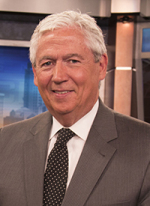
Kevin Cooney
Kevin Cooney, a 1974 alumnus of the journalism program and former news anchor at KCCI television, Des Moines, will give the undergraduate address. A Des Moines native, Cooney worked part time at the station during high school and college, and upon graduation, landed a full-time reporting job there. He left for two years, 1980-82, to work in San Jose, California, but returned to KCCI as an anchor for the evening newscasts and remained for 33 years until his November 2015 retirement.
Some of Cooney's notable work includes inauguration coverage for former presidents Bill Clinton and George W. Bush, reports during the historic Des Moines flood of July 1993 and, in 1991, live reports from Germany when hostages -- and ISU alumni -- Terry Anderson and Tom Sutherland were released after six-plus years in captivity in Lebanon.
Graduating students and their friends and family members are invited to participate in a live Twitter feed before and after the undergraduate ceremony. Tweets won't be added during the ceremony. Tweets that contain #CyclONEgrad will be included in the online tagboard conversation.
College receptions
Final exams conclude by noon on Friday, allowing colleges to honor their graduating students during college or departmental events Friday afternoon and evening and Saturday morning. Traditional aspects of commencement -- such as wearing caps and gowns or conferring diplomas -- will occur at the two university ceremonies. Details about college receptions and convocations are online.
Events to entertain your houseguests
If you're hosting out-of-town guests over winter break and need a few ideas for your back pocket, here are some ISU possibilities in the coming weeks:
Wednesday, Dec. 20
- 6 p.m., Men's basketball vs. Maryland Eastern Shore, Hilton Coliseum, $25 and up
- 7:30 p.m., Concert, Mannheim Steamroller's 33rd annual Christmas tour, Stephens Auditorium, $70-$90 (single seats only)
Thursday, Dec. 21
- 6-8 p.m., Speed crafting, Reiman Gardens, $12.50 (members $10), must be 21 years old (optional: bring your own wine, beer or nonalcoholic beverage)
- 1 p.m., Women's basketball vs. Nicholls State, Hilton Coliseum, $10-$12
Thursday, Dec. 28
- 6:30 p.m., Women's basketball vs. Kansas, Hilton Coliseum, $10-$12
Friday, Dec. 29
- 8 p.m., Men's basketball vs. Kansas State, Hilton Coliseum, $25 and up
Saturday, Dec. 30
- 11:30 a.m., Football vs. Memphis, Liberty Bowl, from Memphis, Tennessee, ABC-TV broadcast
Sunday, Dec. 31
- 2 p.m., Women's basketball vs. Oklahoma, Hilton Coliseum, $10-$12
Monday, Jan. 1
- 6 p.m., Men's basketball vs. Texas, Hilton Coliseum, $34 and up
